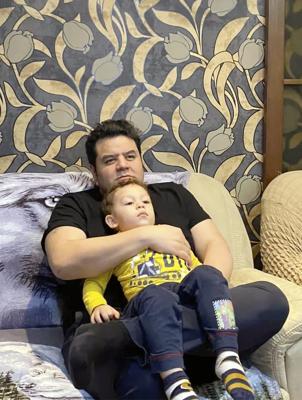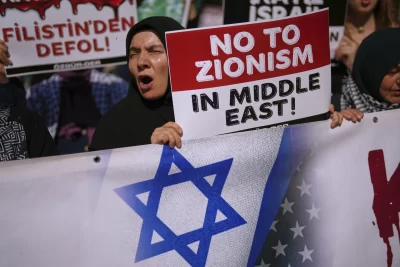
Russia was massing troops on the border with Ukraine when an increasingly desperate Cesar Quintana went to the U.S. embassy in Kyiv in December to plead for a passport for his toddler son, who had been abducted from their Southern California home a year earlier by his Ukrainian-American mother.
Quintana got a U.S. court order showing he had sole legal custody of 2-year-old Alexander. He was granted the passport, bought plane tickets and a few days later headed to the airport for a flight home.
But they never boarded the plane. Police who he said were summoned by Alexander’s Ukrainian grandmother — the mother of Quintana’s estranged wife — ordered the boy be turned over to her.
Now, three months later, Ukraine is ravaged by war. The city of Mariupol where Alexander has been living with his mother at his grandmother’s home is under siege. Quintana, who is back in the U.S., has lost contact with them and is so distraught he’s considering going into the war zone to find his son.
“I am willing to do everything and anything,” Quintana told The Associated Press. “I just want my son to be back.”
Quintana, 35, said he last spoke with Alexander over FaceTime on March 2. He said he sent money to his estranged wife, Antonina Aslanova, for supplies but never heard back.
Communications have been disrupted across Mariupol because of the Russian bombardment, which this week included an airstrike that blew apart a theater being used as a bomb shelter by hundreds of civilians. Tens of thousands have fled the city, and an unknown number have been killed.
Efforts by the AP to reach Aslanova were not successful. Email and LinkedIn messages were not returned. She currently doesn’t have a lawyer in the child custody case in California, and a U.S. phone number she provided the court wasn’t working. A message was left on another phone listed under her name.
Andrew Klausner, who was Aslanova’s divorce lawyer when she previously sought and was denied a restraining order against Quintana, said he hadn’t had contact with her since the fall of 2020 and didn’t know she had left the country.
Quintana has set up a website about his plight and traveled to Washington, D.C., this week to try to get members of Congress to help and to ask Ukrainian diplomats in the nation’s capital for permission to enter their country.
The State Department declined to comment on the case, but wrote in a Feb. 15 letter to California U.S. Rep. Lou Correa’s office that when Quintana tried to take his son back to his Orange County home in December he didn’t have the consent of the boy’s mother, nor approval from Ukrainian authorities overseeing the custody fight there.
“Although a left-behind parent in the United States may have custody or visitation rights pursuant to a U.S. custody order, that order may not be valid and enforceable in the country in which the child is located,” wrote April Conway, the department’s branch chief for the office of children’s issues.
The letter also said State Department officials were asking Ukrainian officials why a critical February court hearing on the boy’s case was delayed until late March.
International parental child abduction cases are complex, and advocates say relatively few of the children taken from their countries of residence are returned. But the issues are even more complicated for Quintana’s son since the embassy in Kyiv is closed because of the war and the State Department has said it can assist American citizens with consular services once they leave Ukraine and get to another country.
Noelle Hunter, co-founder of the iStand Parent Network, said her group wants to draw attention to Quintana’s case so U.S. government officials and nonprofit groups can step in quickly once the fighting subsides. Hunter’s daughter was taken to war-torn Mali, and she was able to bring her home with help from U.S. officials in 2014.
Many of the details of Alexander’s case are spelled out in a September letter from Orange County deputy district attorney Tamara Jacobs to Ukrainian officials.
Alexander was abducted in December 2020 as Quintana and Aslanova were divorcing, according to the letter. Quintana was granted custody of Alexander after she was arrested for investigation of driving under the influence.
Quintana said he allowed Aslanova to visit their son at his home as Quintana recovered from gall bladder surgery. He said he fell asleep and when he woke in the afternoon she and Alexander were gone.
Quintana texted Aslanova and said she wasn’t allowed to leave with the boy; she responded they were at a store. Quintana called police, who the next day told him Aslanova and Alexander had gotten on a flight to Turkey and then to Ukraine, according to the district attorney’s office, which charged her with child abduction.
In March 2021, a California family law judge ordered that Alexander be returned. “The court ruled that there were no exigent circumstances for mother to have taken the child and the taking was wrongful,” Jacobs wrote in the letter.
The same month, Aslanova filed a declaration with the court in her DUI case saying she had no plans to return to the United States.
Meantime, Quintana obtained a visa and traveled to Ukraine, where he hired a lawyer to try to get his son returned. Quintana said he had remained in touch with Aslanova, provided financial support to her family and once in Ukraine was allowed visits with the boy.
Quintana said he tried to convince Aslanova to let him take their son back to California and that she should also return to face her legal issues. He said during a November phone call she finally consented and told him that her mother, who had been caring for their son, would bring Alexander to him at his Mariupol hotel.
As soon as he had the boy, they left in a car for Kyiv. Quintana said he was stopped by police twice on the 14-hour trip. Authorities confirmed he was the boy’s father and allowed them to continue but took their American passports.
In Kyiv, Quintana went to the U.S. embassy to get new passports. He said officials there demanded more than a temporary custody order to issue a passport for the boy, so he wrote to the family court in California seeking an order for the document. He said he was worried about a possible Russian invasion.
“If this happens, I am fearful Alexander and I will not be safe and American flights to Ukraine will be cancelled for an unknown period of time,” Quintana wrote. An order was made and the passport issued.
He and Alexander spent Christmas together and made plans to fly back to the United States before the new year. He said he spoke with Aslanova by phone and she asked him not to leave her behind.
But Aslanova’s mother, he said, didn’t want the boy to go and filed a complaint against Quintana with Mariupol police. He said she accompanied police when they stopped him at the Kyiv airport. Police showed him a document written in Ukrainian — which he doesn’t understand — and threatened to arrest him if he didn’t turn over the child, Quintana said. His son became distraught, Quintana said, so he gave him to his grandmother to avoid further stress on the boy.
Quintana provided a copy of the police document to the AP, which enlisted a translator to read it. The document alleged Quintana took the boy from his Mariupol hotel in late November without permission from the child’s mother and called for an investigation to determine whether Quintana was legally allowed to take the boy.
As he turned over his son, Quintana said he kissed Alexander and told him: “Bye for now, son, but I won’t give up. I’ll bring you home.”
Quintana said his Ukrainian lawyer told him the document was a pretense to block him from leaving. He said he remained in Ukraine until late January but left when he was denied a visa extension. He said he had hoped to get his son back after an international parental child abduction hearing scheduled for February but it was postponed to March.
Then war broke out. Quintana’s Ukranian lawyer now is in the military fighting the Russians.
Quintana said he’s willing to do anything to bring Alexander to the U.S. He said he told Aslanova he’d help her with a lawyer for her DUI case if she returns. He said he’d even help sponsor her mother so she could join her in America.
He plans to buy a ticket to Poland next week and may try to enter Ukraine from that neighboring country.
“I am not really sure what I am going to do, but I just want to be there close if an opportunity presents itself for him to leave the country,” he said.



